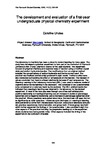The development and evaluation of a first-year undergraduate physical chemistry experiment
| dc.contributor.author | Uncles, C. | |
| dc.date.accessioned | 2019-05-21T16:15:52Z | |
| dc.date.available | 2019-05-21T16:15:52Z | |
| dc.date.issued | 2018 | |
| dc.identifier.citation |
Uncles, C. (2018) 'The development and evaluation of a first-year undergraduate physical chemistry experiment', The Plymouth Student Scientist, 11(1), p. 238-281. | en_US |
| dc.identifier.issn | 1754-2383 | |
| dc.identifier.uri | http://hdl.handle.net/10026.1/14180 | |
| dc.description.abstract |
The laboratory in chemistry has been a place for student learning for many years. The study here developed a practical experiment to form part of the curriculum of Plymouth University’s BSc (Hons) Chemistry course for first year students. The experiment focused on physical chemistry and explored rates of reaction using a modified crystal violet and sodium hydroxide reaction. The modifications from an original method included the concentrations of sodium hydroxide and the instrument used. The practical was finalised and lab script produced in eight weeks. Further studies were also conducted surrounding the effect of temperature on the reaction. The resultant K’ values concluded that there is a linear relationship between K’ and temperature. The Meaning Learning in the Laboratory Instrument (MLLI) was used to measure students’ cognitive and affective learning in the laboratory. This consisted of two questionnaires to be completed on a voluntary basis by the students. The MLLI yielded results that indicated that meaningful learning was obtained in the laboratory for the devised experiment. A trend in the data was seen through use of box and whisker plots, positive relationship to meaningful learning saw an increase in students’ percentage agreement and a negative relationship saw a decrease in percentage agreement after the practical. Where questions were asked about data, the trend was still seen, but not as significantly as other questions. Influences upon the impact of meaningful learning were perceived to come from: the laboratory instructor, structure of laboratory and pre-lab, previous experiences, instrumentation, and group work. A focus group was held which further supported the findings of the questionnaire. It also provided insight into other aspects of the practical including the preparation leading up to the experiment where students watched a pre-lab video. Other aspects included the timing of the experiment in the curriculum timetable. | en_US |
| dc.language.iso | en | en_US |
| dc.publisher | University of Plymouth | |
| dc.rights | Attribution 3.0 United States | * |
| dc.rights.uri | http://creativecommons.org/licenses/by/3.0/us/ | * |
| dc.subject | physical chemistry experiment | en_US |
| dc.subject | evaluation | en_US |
| dc.subject | first year undergraduate | en_US |
| dc.subject | Meaning Learning in the Laboratory Instrument | en_US |
| dc.subject | BSc(Hons) Chemistry | en_US |
| dc.subject | group work | en_US |
| dc.subject | cognitive and affective learning in the laboratory | en_US |
| dc.title | The development and evaluation of a first-year undergraduate physical chemistry experiment | en_US |
| dc.type | Article | |
| plymouth.issue | 1 | |
| plymouth.volume | 11 | |
| plymouth.journal | The Plymouth Student Scientist |



